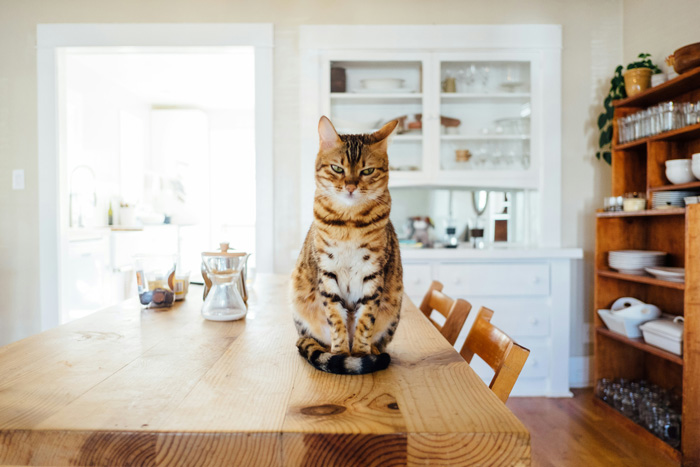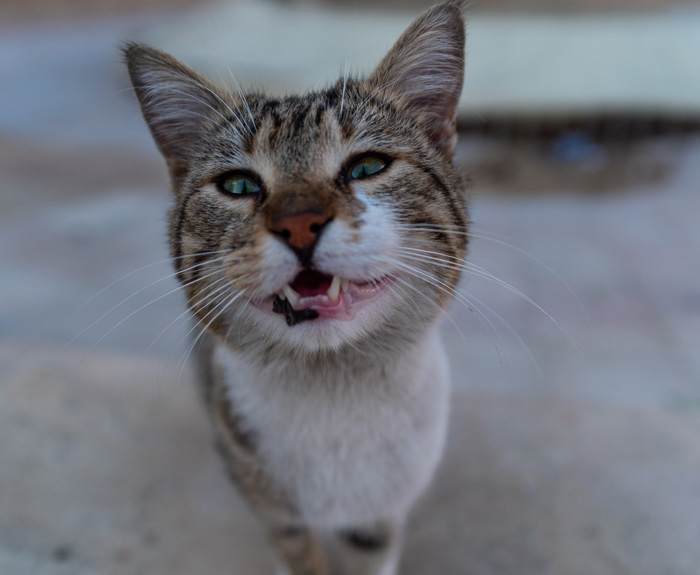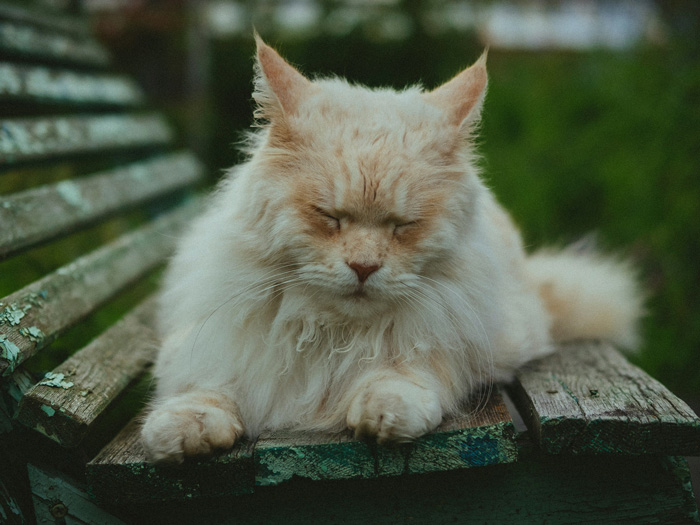Cats exhibit a fascinating and intricate relationship with food, often following precise routines and preferences. However, disruptions in their eating habits can raise concerns for cat owners. Exploring the complexities of a cat’s appetite sheds light on various reasons why a feline companion might refuse food or display changes in eating behavior.
HighlightsHealthy cats can go 24-48 hours without food but not without water.Seek vet care if a cat hasn’t eaten in 3 days due to risk of hepatic lipidosis.Dental issues, allergies, and stress can lead to a cat’s refusal to eat.Senior cats may eat less due to health issues like arthritis or weak senses.
We’ll delve into the top ten reasons behind a cat’s refusal to eat, ranging from dietary changes and medical issues like gastrointestinal problems, dental issues, and allergies to behavioral and age-related factors.
By uncovering these reasons, pet owners can better comprehend their cat’s behavior and make informed decisions to ensure their furry companions receive proper care and attention when faced with appetite issues.
The information provided herein is for informational purposes only. Please refer to ourdisclaimerfor more details..
Table of ContentsHow long is it safe for a cat not to eat?What should you do if the cat hasn’t eaten in 3 days?How long can cats go without food and water?10 Key reasons the cats stop eating
How long is it safe for a cat not to eat?
A cat not eating for even a day or two can be concerning, but it’s crucial to note that a healthy adult cat can typically go without food for about24-48 hours without significant harm. However, longer than that could lead to potential health risks, especially if the cat isn’t drinking water.
What should you do if the cat hasn’t eaten in 3 days?
If a cat hasn’t eaten in three days,seeking immediate veterinary attention is essential. Not eating for this duration can indicate a severe underlying issue that requires prompt medical intervention.
Cats can develop a condition called hepatic lipidosis, or fatty liver disease when they go without eating for an extended period, which can be life-threatening if not addressed promptly.
Moreover, an extended period without food can damage intestinal mucosa, which, if irreversibly damaged, can significantly impact cats’ ability to digest food.
How long can cats go without food and water?
Image credits:Paul Hanaoka

When it comes to the duration a cat can survive without food and water, it’s more dire without water than without food. While a cat might survive for several dayswithout food,typically ranging from about3-7 days, the absence of water is much more critical.Without water, a cat’s survival span drastically decreases to only a few days. it’s crucial to ensure they have access to fresh water as they can survive days without eating but not without water.
Always prioritize seeking professional veterinary care if your cat refuses food for an extended period, especially if it extends beyond 48 hours. Your vet can diagnose the underlying cause and provide the necessary treatment to ensure your cat’s well-being.
10 Key reasons the cats stop eating
1.) Change in Food:Cats can be particularlysensitive to abrupt changes in their diet. Sudden alterations in thetype or brand of cat foodoffered to a cat, especially transitioning from dry food to wet food or vice versa, might lead to a refusal to eat.
Cats often prefer routine and familiarity in their meals, and introducing new food without a gradual transition can cause digestive upset or simply result in them rejecting the new food. Kittens are also more sensitive to differentcat food.
Such sudden diet alterations can provoke stress or anxiety in cats, impacting their willingness to eat, causing appetite loss, or even making them reluctant to eat altogether.
2.) Gastrointestinal Problems:
Gastrointestinal issues such as constipation, blockages, or ingesting foreign objects can significantly impact a cat’s appetite and overall well-being. Constipation in cats can cause discomfort or pain while passing stools, potentially leading to a loss of appetite as the cat associates eating with discomfort during bowel movements.
On the other hand, blockages resulting from ingested foreign objects can obstruct the digestive tract, causing pain, nausea, and potentially leading to a reluctance to eat due to the associated discomfort and illness.
If left untreated, these conditions can severely affect a cat’s health and require immediate veterinary attention.
3.) Dental Issues:
Dental problems like gum disease, tooth decay, or oral injuries can cause pain or discomfort while chewing. Cats may avoid eating due to the pain, which could stem from issues like periodontal disease, broken teeth, or mouth injuries.
Image credits:Robert Bahn

Even a toothache can discourage a cat from eating, as they associate the act of eating with pain. Offering soft or wet food to cats dealing with oral injuries or broken teeth can alleviate discomfort and help maintain their nutritional intake while they recover.
4.) Allergies:
Cats can develop allergies or sensitivities to certain ingredients in their cat food. These allergies might manifest as skin issues or gastrointestinal problems, leading to a refusal to eat their regular food. Identifying and eliminating the allergen from their diet, such as switching to hypoallergenic cat food, can often resolve this issue.
Cats are obligate carnivores, and ensuring that the cat’s diet is free from potential allergens like grains or specific proteins can mitigate allergic reactions and encourage the cat to resume eating.
5.) Stress or Anxiety:
Cats are sensitive to changes in their environment or routine. Stressors like new pets, moving houses, loud noises, or disruptions in their daily schedule can lead to anxiety or stress. There are many reasons for a cat to stop eating suddenly. Even simply changing their food bowl might give your cat red signals.
These emotional disturbances can significantly impact a cat’s appetite, causing them to eat less or refuse food altogether. Providing a quiet, safe space or using pheromone diffusers can help alleviate stress or anxiety, encouraging a cat to resume regular eating habits.
6.) Environmental Changes:
Any alterations in a cat’s environment, whether it’s a change in location, rearrangement of furniture, or other disruptions, can induce stress. Cats rely on familiarity and can become anxious or distressed when their environment changes, impacting their eating habits negatively.
Providing comfort items like their favorite toys or maintaining a consistent routine amidst such environmental changes can help cats adjust and reduce the impact on their appetite.
7.) Old Age:
Senior cats experiencing changes in location and dealing with cat behavior may decline theirappetite due to age-related changes. Health issues like arthritis, dental problems, or declining senses of smell and taste can notably contribute to a reduced interest in cat food among older cats.
Image credits:Roman Trifonov

Ensuring enough water and providing specialized diets like wet cat food or pet food formulated for senior cats can support their nutritional needs during this phase. If a cat hasn’t eaten in 24 hours or exhibits reluctance to eat, it’s crucial to seek veterinary advice.
8.) Obesity:
Paradoxically, overweight cats might lose appetite due to underlying health conditions linked to obesity. Conditions like diabetes or joint problems can notably impact their willingness to eat, regardless of their weight.
Managing a balanced diet with cat food specifically designed for weight management and addressing health issues related to obesity can assist in improving their appetite and overall health.
9.) Illness:
Cats, when unwell, may face challenges in maintaining their regular food intake. Various illness in cats can significantly impact their appetite, ranging from minor concerns to severe illnesses.
10.) Medication Side Effects:
Certain medications might have appetite-suppressing side effects in cats. Suppose a cat starts a new medication regimen and suddenly loses appetite. In that case, it’s essential to consult a veterinarian to evaluate whether the medication is causing this change in eating behavior.
Understanding a cat’s reluctance to eat is crucial to responsible cat ownership. Whether it’s observing subtle behavioral changes or recognizing the impact of health conditions, addressing a cat’s eating habits necessitates attention and sometimes immediate veterinary care.
303views303views
Pet Wellness